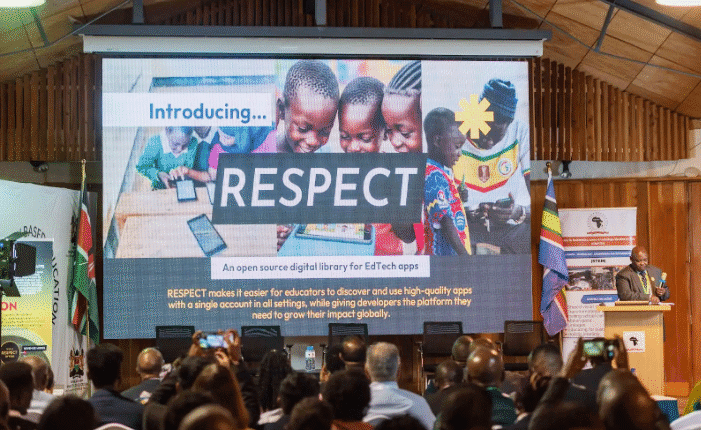In a landmark announcement at the STEMtastic Adventures! Africa symposium, the Spix Foundation unveiled RESPECT™, a Digital Public Infrastructure (DPI) for Education, designed to fast-track the realization of AUDA-NEPAD’s Africa EdTech 2030 Vision.
The African Union Development Agency’s vision, announced earlier this month, is bold: by 2030, every African learner should have access to world-class, interactive digital courseware—developed in Africa, by Africans—accessible on the smartphones already present in students’ pockets, homes, or schools.
With the release of RESPECT Version 1, Africa has taken a significant lead in the global EdTech space—becoming the first continent to launch a dedicated DPI for education. While the United Nations is only beginning to discuss such frameworks, Africa is already implementing one.
“Much of EdTech is pilot-driven and disconnected from national education systems,” said John Kimotho, EdTech Consultant with the Spix Foundation and Head of the RESPECT Africa Office. “RESPECT changes that by giving policymakers, educators, and developers a shared foundation to create scalable, sustainable tools that meet real classroom needs.”
A Timely Launch Amid Sobering Realities
RESPECT’s unveiling comes at a critical moment. New data from AUDA-NEPAD highlights the scale of the challenge:
Only 40% of African primary schools have internet access
Around 30 million primary-age children remain out of school
Africa will need 17 million more teachers by 2030 to maintain universal education access
Meanwhile, billions of dollars invested in EdTech across the continent have largely resulted in disconnected, short-lived pilot projects—rather than scalable systems.
“Africa doesn’t just need digital tools—it needs a digital ecosystem,” said Kimotho. “RESPECT enables that ecosystem by flipping the equation: it supports local innovation and makes scaling the norm, not the exception.”
Tackling Fragmentation and ‘Tool Fatigue’
One of the most persistent obstacles facing EdTech in Africa is market fragmentation. According to a recent mEducation Alliance report, developers must navigate unique regulations, procurement systems, and curriculum standards in nearly every African country.
This creates a landscape of “small-batch deployment”—a pilot in Kenya here, a district project in Senegal there—with each requiring costly retooling. Even successful innovations often remain confined within national borders. For example, Senegal’s Wolof-language platform XamXam, serving over 1.2 million users, remains virtually unknown outside the country.
Teachers, meanwhile, are burdened by what experts call “tool fatigue”—juggling siloed apps that offer little integration or data continuity.
“This discourages even the best apps from being widely adopted,” notes the mEducation Alliance. “Without a common infrastructure, developers and teachers alike are set up to fail.”
RESPECT: Designed for Scale, Built for Africa
RESPECT directly addresses two of the most pressing challenges outlined in the Africa EdTech 2030 Vision:
The lack of real-time, reliable data on what tools work best for which learners
The policy, technical, and commercial barriers that prevent promising innovations from scaling
All RESPECT Compatible™ applications automatically send anonymized, jurisdiction-compliant data on learner interactions to relevant educational authorities. This enables the deployment of data-driven teaching strategies such as Teaching at the Right Level (TaRL) and Structured Pedagogy—and allows for real-time courseware evaluation and ranking at both national and continental levels.
On the policy front, RESPECT implements AUDA-NEPAD’s newly released Policy Framework for Standards-Based, Vendor-Neutral EdTech, now open for public comment.
Technically, RESPECT offers:
Offline-first design, enabling courseware to function seamlessly online, offline, or intermittently connected
Built-in support for local language translation and curriculum alignment
Standardized interoperability via APIs like xAPI, OneRoster, and OAuth
Use of cutting-edge on-device technologies including data compression, proxy caching, and mesh networking
Commercially, the model is equally ambitious. All RESPECT Compatible™ apps will be free to end-users—including students, schools, and educational NGOs. Developers and localizers are compensated based on app usage—and later, measured learning impact—via a sponsorship-funded revenue pool.
“Think of it as ‘YouTube meets PBS Kids’ for African EdTech,” explained Kimotho. “It’s free for students, sustainable for developers, and focused on results.”
A Race Against Time
While the infrastructure is in place, stakeholders agree that time is of the essence.
“The opportunity is historic—but time is short,” Kimotho emphasized. “Africa has the lead, but we must now move swiftly to dismantle the remaining barriers, align stakeholders, and empower developers to build for scale.”
As the rest of the world begins to explore what a DPI for education might look like, Africa has already delivered one. With RESPECT, the continent has a powerful tool to turn the Africa EdTech 2030 Vision into reality—starting now.



